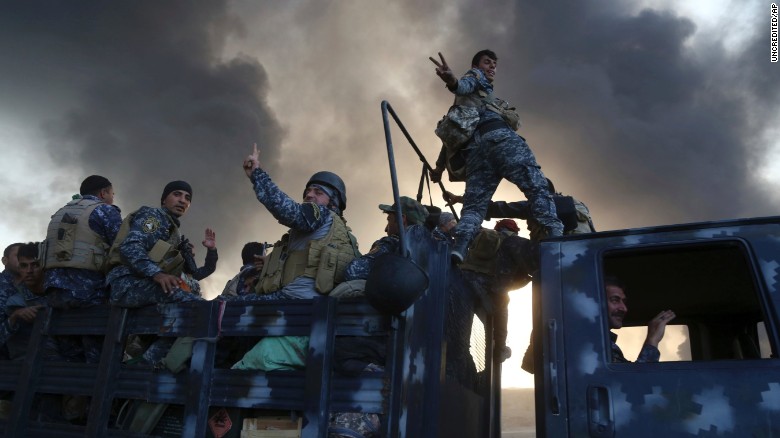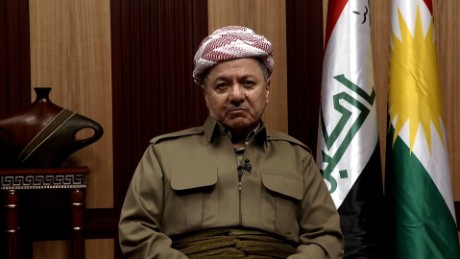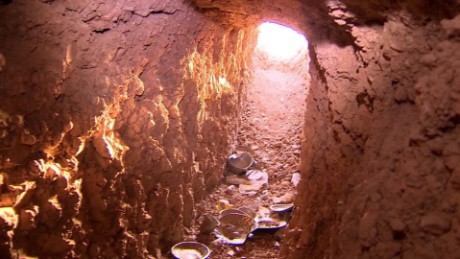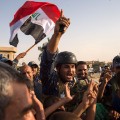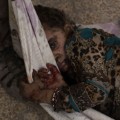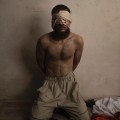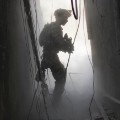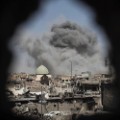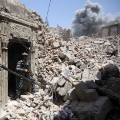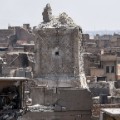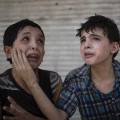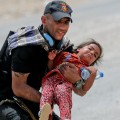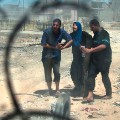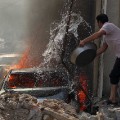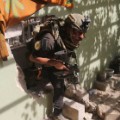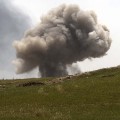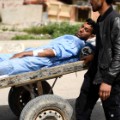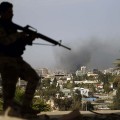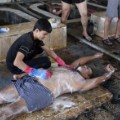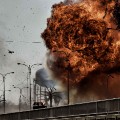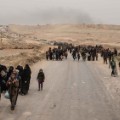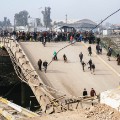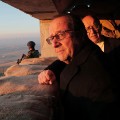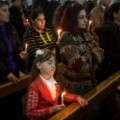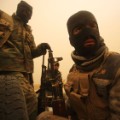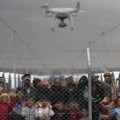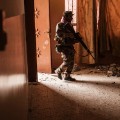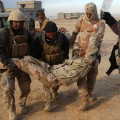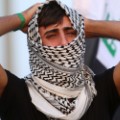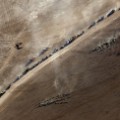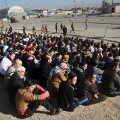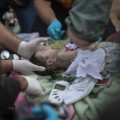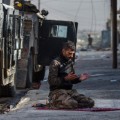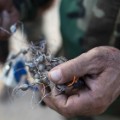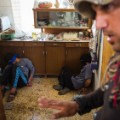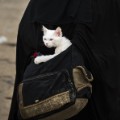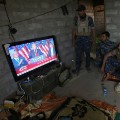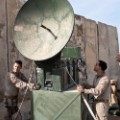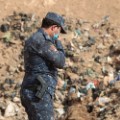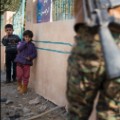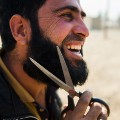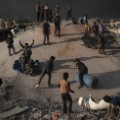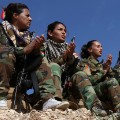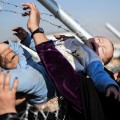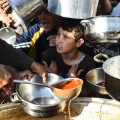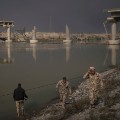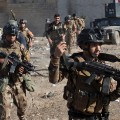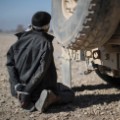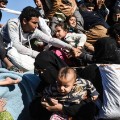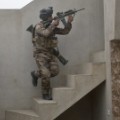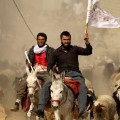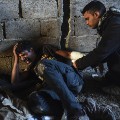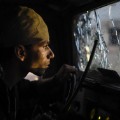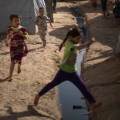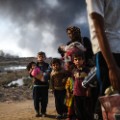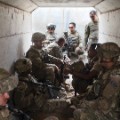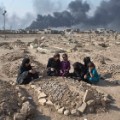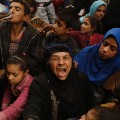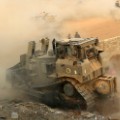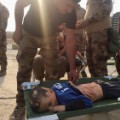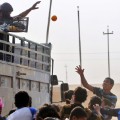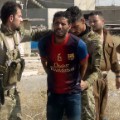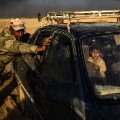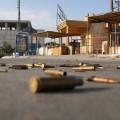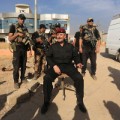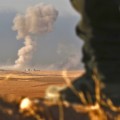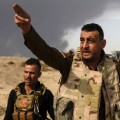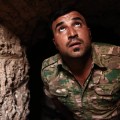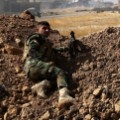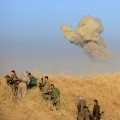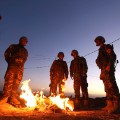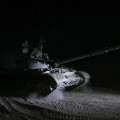"We would have loved to have a political plan along with a military plan, how to manage Mosul, how to administer Mosul, because Mosul has a variety of religions, with ethnicities," Barzani told CNN's Christiane Amanpour on Wednesday.
The operation to free Mosul from two years of ISIS rule marks the first time Kurdish Peshmerga and Iraqi forces have fought against a common enemy, Barzani said.
"We are looking for a good solution for Mosul," he said.
But the battle to free Iraq's second-largest city could be marked with months of bloody fighting.
Attempt to free Christian town
On the road to Mosul, Iraqi-led forces have besieged a Christian town in an attempt to liberate it from ISIS control, but they are facing fierce resistance and exchanging heavy gunfire with militants, a paramilitary general told CNN.
Iraqi security forces, Peshmerga fighters and a Christian paramilitary group have forced ISIS fighters into the center of Qaraqosh, where airstrikes are pounding the militants, in apparent coalition support of the assault, Gen. Amr Shamoun from the Christian militia group said.
It's the latest clash with ISIS militants in
the coalition's aggressive push toward Mosul aimed at unshackling the strategic city from the terror group's brutal control.
The operation has been complicated since ISIS apparently brought civilians into Qaraqosh, which was abandoned after militants took over in 2014.
Part of Qaraqosh has already been liberated, Shamoun said.
Qaraqosh is just one town coalition forces are trying to liberate. The Iraqi army's armored division is closing in on Mosul's fringes after sweeping through enemy-controlled land in two days, freeing communities village by village, the division's commander told CNN on Wednesday.
Recent developments
Lt. Gen. Qassim al-Maliki, commander of the Iraqi 9th armored division, told CNN that in two days:
ŌĆó The armored division has advanced; it is now three to four miles from the outskirts of Mosul.
ŌĆó Three brigades have liberated 13 villages to the north and northeast of Quwayr.
ŌĆó At least 50 ISIS militants and two Iraqi soldiers have been killed, and 25 soldiers injured.
ŌĆó Dozens of suicide vehicles and a large number of improvised explosive devices have been destroyed.
Marching toward Mosul
In the latest move to oust ISIS, Peshmerga forces launched a "large-scale operation" Thursday northeast of Mosul, the General Command of Peshmerga Forces of Kurdistan Region announced.
According to a statement, the operation will be carried out on three fronts. The advance follows recent gains by Kurdish Peshmerga Forces in east Mosul and advances by Iraqi Security Forces in south Mosul.
Celebrations turn sour
Qaraqosh was a Christian town, home to 50,000 before ISIS took control. An exodus saw thousands flee to Mosul, only to be forced out again when ISIS took that key city.
Many of those who fled are now living in Irbil, where they celebrated Tuesday when they heard Iraqi forces had entered their hometown.
They held a vigil overnight, holding candles and singing hymns, images showed, while others gathered in the street, cheering and dancing.
But their celebrations may have come too soon. ISIS appeared to be putting up a real fight in Qaraqosh, as the terror group has in several areas since the operation launched Monday.
Another Iraqi military official, speaking on condition of anonymity, told CNN that ISIS fighters have surrounded Iraqi units around the village of Al Absi, near Nimrud, 12 miles (20 kilometers) south of Mosul. The area has seen heavy fighting in the last 36 hours.
Edging closer
Maliki, the Iraqi commander, said his division was around three to four miles (five to six kilometers) from the city's outskirts. He said progress had slowed as protective forces were needed in newly liberated areas to hold ground.
His comments echo those of Sirwan Barzani, a Peshmerga military commander, who told CNN the battle to recapture Mosul
could take two months.Barzani said it would likely take two weeks for advancing forces to enter the city. Iraq's leaders have said that only Iraqi government troops and national police officers will be allowed to do so amid fears of sectarian retribution, he said.
The coalition's more than 94,000 members vastly outnumber their opponents. But ISIS, expecting the push, has constructed elaborate defenses, including a network of tunnels.
Advancing Iraqi forces sometimes encounter ISIS fighters who seemingly pop out of the ground to fire weapons. The tunnels wind through hills, with one entrance not far from an exit.
Coalition forces will also likely face suicide bombings, car bombs and booby traps.
Up to 5,000 ISIS fighters are in Mosul, a US military official said. ISIS' supporters put the number at 7,000.
A US general said some local ISIS leaders are fleeing.
"We are telling Daesh that their leaders are abandoning them, and we have seen movement out of Mosul," US Army Maj. Gen. Gary Volesky said in a video briefing from Baghdad, referring to ISIS by another name.
ISIS distributed leaflets Wednesday evening to residents, demanding they hand over their mobile phone SIM cards and remove all antennas from the roofs of their homes. ISIS representatives will collect the SIM cards over the next 24 hours, according to the leaflets. Anyone who fails to comply will be arrested, according to the leaflets.
A unit of what appeared to be US special forces advisers entered ISIS territory Monday with the first armored convoy of Peshmerga, a CNN team observed. They followed a dozens-strong unit of Kurdish armor bound for ISIS positions, placing American forces at the front of the fight to retake Mosul.
CNN's Arwa Damon, Nick Paton Walsh, Hamdi Alkhshali and Ben Wedeman reported from near Mosul, and Tim Lister from Irbil, while Angela Dewan wrote from London. CNN's Tim Hume, Euan McKirdy, Kristie Lu Stout, Isil Sariyuce, Holly Yan, Max Blau and Barbara Starr contributed to this report.
